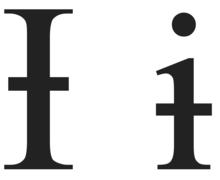Ɨ
I-bar (majuscule: Ɨ, minuscule: ɨ), also called barred i, is a letter of the Latin alphabet, formed from I or i with the addition of a bar.
| Ɨ ɨ |
| Ɨ ɨ |

In the International Phonetic Alphabet, ɨ is used to represent a close central unrounded vowel. In American linguistic tradition, it is used to represent the weak vowel heard in the second syllable of roses when distinct from Rosa's.[1] For related uses of the small capital barred i, see near-close central unrounded vowel.
The ISO 6438 (African coded character set for bibliographic information interchange) gives lowercase of Ɨ as ɪ, a small capital I, not ɨ.
| Preview | Ɨ | ɨ | ᵻ | |||
|---|---|---|---|---|---|---|
| Unicode name | LATIN CAPITAL LETTER I WITH STROKE | LATIN SMALL LETTER I WITH STROKE | LATIN SMALL CAPITAL LETTER I WITH STROKE | |||
| Encodings | decimal | hex | decimal | hex | decimal | hex |
| Unicode | 407 | U+0197 | 616 | U+0268 | 7547 | U+1D7B |
| UTF-8 | 198 151 | C6 97 | 201 168 | C9 A8 | 225 181 187 | E1 B5 BB |
| Numeric character reference | Ɨ | Ɨ | ɨ | ɨ | ᵻ | ᵻ |
Variations
| Ɨ̆ ɨ̆ |
| Ɨ̆ ɨ̆ |
| Ɨ́ ɨ́ |
| Ɨ́ ɨ́ |
ɨ̆, small barred i written with a breve, represents a very short close central unrounded vowel. The breve indicates a very short, or overshort vowel.
In the Golin language, ɨ̆ is used in the IPA transcription of the very short high central epenthetic vowel phone, which is restricted to syllables closing with a sonorant.
Barred i is found written with an acute accent (majuscule: Ɨ́, minuscule: ɨ́) in the orthographies of several languages, including Bangolan, Bora, Chiquitano, Cora, Guarayo, Witoto, Inapari, Kenyang, Nzime, Kwanja, Mpade, Mfumte, Noni, and Orejón. Depending on the language, the accent diacritic serves either to indicate the location of a word's primary stress or to mark rising tone.
See also
- ɫ (L-tilde)
- D with stroke
- U bar
- Ŧŧ
- Ы
References
- Flemming, E., Johnson, S. (2007), "Rosa’s roses: reduced vowels in American English", Journal of the International Phonetic Association 37/1, pp. 83–96.